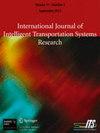如何分配电动车的充电申请?基于预约的方法
IF 1.5
Q3 TRANSPORTATION SCIENCE & TECHNOLOGY
International Journal of Intelligent Transportation Systems Research
Pub Date : 2023-09-27
DOI:10.1007/s13177-023-00367-z
引用次数: 0
摘要
摘要:随着电动汽车数量的不断增加,充电基础设施的扩展空间有限。特别是在城市地区,在有吸引力的地区有停车位,建立新的充电站的机会非常有限。这导致一些非常有吸引力的充电站超载,而不那么有吸引力的充电站利用率不足。在此背景下,本文提出了一种电动汽车预订系统的设计,旨在分配充电基础设施的使用,特别是在城市地区。运用设计科学的方法,得出了基于保留的利用方法的需求,并建立了合适的分配方法模型及其实例。基于充电站实际利用率数据,通过模拟分布效果对人工智能进行评价。本文章由计算机程序翻译,如有差异,请以英文原文为准。
How to Distribute Charging Requests of Electronic Vehicles? A Reservation-based Approach
Abstract The number of electronic vehicles increase steadily while the space for extending the charging infrastructure is limited. In particular in urban areas, where parking spaces in attractive areas are famous, opportunities to setup new charging stations is very limited. This leads to an overload of some very attractive charging stations and an underutilization of less attractive ones. Against this background, the paper at hand presents the design of an e-vehicle reservation system that aims at distributing the utilization of the charging infrastructure, particularly in urban areas. By applying a design science approach, the requirements for a reservation-based utilization approach are elicited and a model for a suitable distribution approach and its instantiation are developed. The artefact is evaluated by simulating the distribution effects based on data of real charging station utilizations.
求助全文
通过发布文献求助,成功后即可免费获取论文全文。
去求助
来源期刊

International Journal of Intelligent Transportation Systems Research
TRANSPORTATION SCIENCE & TECHNOLOGY-
CiteScore
3.80
自引率
0.00%
发文量
48
期刊介绍:
This journal is the only transportation journal to report on multi-disciplinary research efforts with the goal to discover solutions to difficult issues in the field. It provides a platform to bring together researchers and specialists in the fields of transportation, electrical, mechanical and traffic engineering, as well as those in the areas of policy planning, economics, and psychology, for wide-ranging discussion about future transportation systems. The journal is the global forum for transportation research. Papers published include original research in such areas as: Sensor Technology
Imaging, Laser, Induction Coil, Ultrasonic Sensor and Recognition Technology based on the above mentioned technologies.
Communication Technology and its Applications
Infrared Beacon, Radio Wave DSRC (Dedicated Short Range Communication), ETC (Electronic Toll Collection System), Navigation System
Vehicle Control and Automated Driving
AHS (Advanced Cruise-Assist Highway System), ACC (Adaptive Cruise Control), Lane-Keep, Automatic Driving, Automatically Operated Bus
Safety Improvement and Human Interface
ASV (Advanced Safety Vehicle), Cruise Assist, Simulator
Traffic Control
Incident Detection System, Traffic Measurement, Signal Control, Accident Management
Traffic Planning
Road Planning, Signal Planning, Traffic Simulation
Urban Engineering
Urban Space Modelling, Urban Planning
Transportation Policy, Traffic Economy
Creation & Improvement of Pertinent Laws and Regulations, TDM (Transportation Demand Management), Road Pricing, Privacy Protection
Traffic Psychology
Drivers, Pedestrians and Vulnerable Road Users
Other Applied Technologies
 求助内容:
求助内容: 应助结果提醒方式:
应助结果提醒方式:


